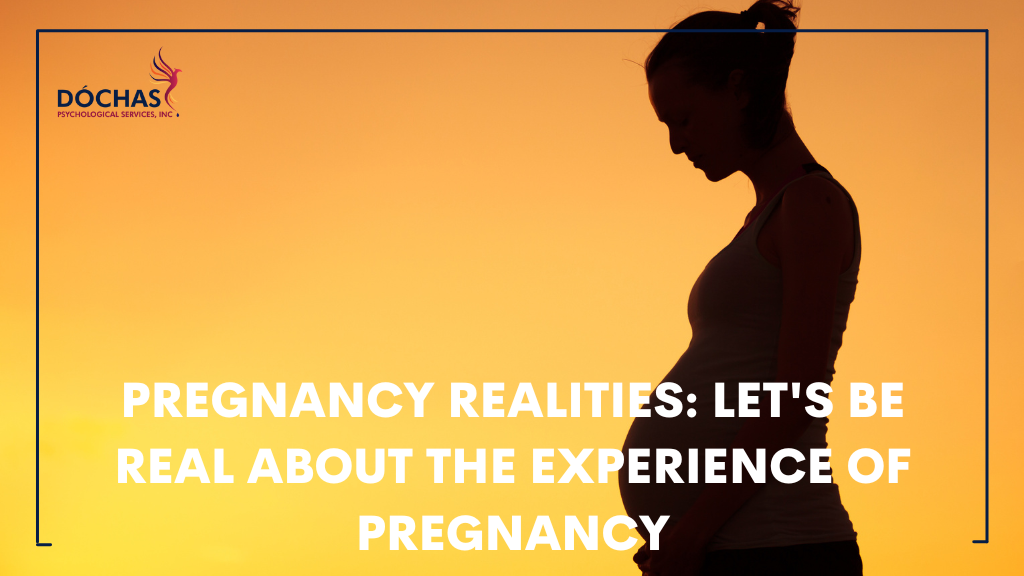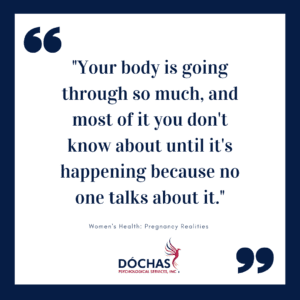It’s not all baby glow and miracles of life! Let’s talk about some pregnancy realities. Hey everyone, it’s Schareen here on the Dóchas blog, and—surprise if you didn’t know—I’m preggo! My new husband and I are thrilled and cannot wait for the next steps, but I have to shed some light on the mental health stuff that has been going on for mama during this time. Hopefully, this will help some of you that may be going through pregnancy realities or those who may need to support a partner, family member, or loved one as they go through this.
Letting The News Sink In
For us, this was a big surprise. We eloped and two days later found out we were moving from newlyweds to soon-to-be parents. It was a whirlwind. I barely absorbed the news before my belly was suddenly doing flip-flops and giving me away to everyone else. During this time, I had a million thoughts running through my mind. Was I ready for this, what will I do about work, and what will this mean for the other plans my husband and I were making?
Navigating Decision-Making
I had to make decisions quickly, and for someone with anxiety and depression, that is scary. So how did I make them? I drew on the support of my husband, my family, and my healthcare team. While something this life-changing can leave you feeling alone, remember there are many resources you can draw on. You may not have a partner or family that can support you—and that’s okay— but don’t forget you can access pregnancy support groups and reach out to friends, your doctors, nurses, support workers, and community groups. These can be invaluable in helping you navigate the realities.
If you are in need of additional supports, check out this helpful link from CMHA. They have put together a list of various resources that can help you feel better supported and informed to be able to make the decisions that are right for you, your health, and the pregnancy.
Stay Connected To Your Feelings
Give yourself permission to not feel okay 100% of the time. I’m not going to lie; I dread the “aw, how are you feeling? Are you just so excited?” because, frankly, people don’t tend to like my answer, which is, “I’m excited about this to be over!” Don’t get me wrong, I’m looking forward to the next part, but this pregnancy jam has been… just awful. I have yet to get to that part where you are ‘supposed’ to enjoy it, and yes, I’m past the first trimester. Your body is going through so much, and most of it you don’t know about until it’s happening because no one talks about it. So, if you don’t love this part, that’s okay—it’s not indicative of how you’ll feel about the baby.
Dealing with Judgements
Ugh! Everyone has an opinion. I never realized how many people were interested in my body until they discovered I was growing a human! But I have gotten more unsolicited advice than I ever have. From meds to breastfeeding to the baby’s name, when people ask me what my personal choice has been, it seems like I’m never right, no matter what I say I have decided to do. This is where I have looked to my closest people for help reminding me that I need to do what’s best FOR ME during this time. If I’m not healthy physically or mentally, then the baby won’t be. This has meant I have made some decisions that others would make differently, such as staying on my anti-depressant, and that’s okay. For this baby to have a chance, I had to recognize that sometimes that means prioritizing myself.
The Topic of Breastfeeding
Breastfeeding… full disclosure, I have absolutely no interest in breastfeeding. I have no judgments about it and if it was for you and your baby, free those boobs, ladies! But for me, this is a no go for a variety of reasons. And because of this, I often get the “Really?! You’re not even going to try?” response or the “Why aren’t you breast-feeding?” response, followed by a mirage of reasons why “breast is best.” Which, to me, feels like “justify your position/explain why you won’t put your needs and wants second to this traditional practice/the baby’s needs.” It amazes me because, well, I have never once heard this response given to a breastfeeding mom. Think about it, while there are a lot of commentaries on the politics of breast-feeding, i.e. when to stop, should it be combined, should it be allowed in public, etc., you never have someone ask if you are going to breast-feed and respond with “really…why?!” if you say yes.
Ignore the Haters
The bottom line is if they aren’t your boobs, please stay out of it! There are various reasons people decide not to breastfeed, from phobias to post-partum concerns, to physical illnesses they don’t want to transmit, and even just plain and simple preference, and frankly, not a single one of them is your business. Fun fact: breastfeeding is one of the biggest struggles most new moms have, and when it doesn’t go smoothly, it can cause physical pain and stress for both mom and baby and contribute to post-partum anxiety and depression. So, own your personal preferred feeding choice, momma, because whatever you choose, as long as your baby is getting food and you don’t have to stress every time you have to feed them, I promise both you and baby will be happier.
C-Section, Vaginal, and Meds, oh my!
Lordy me, this is also a very opinion-sparking topic for everyone not actually giving birth. Some people actually tell expecting mothers that delivery via c-section means they are “less of a mom” or are “taking the easy way out.” There is also a tendency to say c-section vs. natural birth. Let’s clarify here: natural birth refers to the use of medication during labour and delivery, not the delivery itself. So, please be careful how you are phrasing this to a new or expecting mom. This can be a real trigger for a lot of big and overwhelming feelings!
The same thing goes for the decision of whether to do an “all-natural” birth or accept the epidural. This is just my perspective, but you have already done so much throughout the pregnancy that if you want to take the edge of this last step—why not?! If you want to give birth without pain meds, cool, but you don’t actually have to suffer to bring the baby into the world. It doesn’t really benefit anyone in the long run. So, if your plan for pain management includes the epidural, enjoy. If not, and you plan on white-knuckling it through, enjoy. Remember, this is your birth plan. What is right for you, much like everything else discussed in this blog, might not be right for others and that’s okay.
Back to the birth itself: c-section vs. vaginal birth. This is always a hard decision for expecting moms to make. The reality is both come with pros and cons, and like everything else everyone has an opinion, birthing horror story, and perceived right to dictate your medical decisions. The best thing you can do for yourself is to shut out the social pressure. You need to decide what is best for you, your body, and your baby. This usually involves some discussion with your birthing team, and then once you have the information you need to make an informed decision, go with what you want. It won’t make you more or less of a mom. You may even be sacrificing what you originally wanted for the health of both you and your baby. You do not owe people an explanation as to why you chose the method you did—either way, it brought your baby here, and ultimately it won’t make a difference long term!
Postpartum Mental Health
We often hear about the “baby blues” and the hormonal changes that take place after birth which can lead to depressive symptoms. It is really important to be on the lookout for, and monitor, your mental health following the birth of your baby. You are going through so much after that little one comes out. You are navigating your new role as a parent, you may be grieving the transition with your work status, you may feel more strain within your relationship with your partner, and you may even be a little resentful about having to give up your old identity. All of this is perfectly normal. The reason it is important to be aware of this is because if these feelings begin to impact your day-to-day life significantly and for an extended period of time after baby’s arrival, we may be dealing with more than “baby blues” and could be looking at postpartum depression.
Be open with your healthcare provider about what you are feeling, because unfortunately postpartum depression is not the only mental health complication to be on the lookout for. You may also experience postpartum anxiety, obsessive-compulsive symptoms, post-traumatic stress disorder, and in some rare, extreme cases, postpartum psychosis. Luckily, once diagnosed all of these conditions can be treated through a variety of different options such as various therapies and medication. It is important to note that struggling with mental health prior to, and during pregnancy increases the risk for postpartum mental health concerns such as those previously listed. The most important thing is to remember is that there is absolutely NO SHAME in admitting you’re struggling after the birth of your baby. Like we said earlier, this is a huge transition, and your body did a marathon of work (no matter what way the baby arrived!), so naturally there will be some chemical stuff going on in your body that will impact your mental health. The more open you are, and the faster you address it, the less impact it will have on you, your baby, and your relationships.
Disclaimer: This is not medical advice; this is my personal experience. I recommend that if you have medical questions or need to make decisions that can impact your health or the health of your growing baby, you discuss your personal medical situation with your trusted healthcare provider.
I hope I was able to help you understand some of the realities that come along with pregnancy. If you’re looking for someone to talk to on your journey through pregnancy realities, I encourage you to reach out and ask how we can help. You can reach out to us here by calling us at 780 446 0300 or emailing info@dochaspsychologicalservices.com.
About Dóchas Psychological
Dóchas Psychological Services is a well-established and trusted therapy clinic located in Spruce Grove, Alberta. At Dóchas we value the idea that everyone deserves a safe space. Through connection and education, our team works hard to build a trustworthy relationship with each of our clients. It is our goal to create a community for our clients to feel like they belong.
Disclaimer
Information provided through Dóchas Psychological Services blogs or vlogs is meant for educational purposes only. They are NOT medical or mental health advice. You can read more about our disclaimer here.



